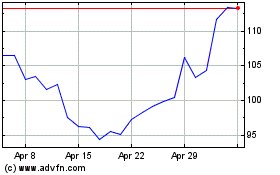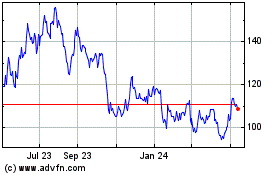China's Homegrown Rival to Uber Valued at Over $25 Billion
April 07 2016 - 5:10AM
Dow Jones News
HONG KONG—Investors in China's homegrown competitor to Uber
Technologies Inc. have revved up the ride-sharing company's
valuation to more than $25 billion.
Beijing-based Didi Kuaidi Joint Co. is close to completing its
latest funding round to raise more than $1.5 billion at a valuation
of over $25 billion, according to people familiar with the
situation.
Didi Kuaidi's biggest existing backers, social-network company
Tencent Holdings Ltd. and online shopping giant Alibaba Group
Holding Ltd., are participating in the latest round, the people
said.
The Chinese startup received strong demand from new and existing
investors and expects to complete the round by the end of this
month, according to the people.
In February, The Wall Street Journal reported that Didi Kuaidi
was planning to raise about $1 billion from investors on terms that
would value the Chinese car-hailing company at more than $20
billion.
While many global startups including some in Silicon Valley have
had difficulty raising money amid a slowdown in the global economy,
Didi Kuaidi has been an exception. Its valuation has soared from
just $6 billion in February 2015 when it was formed from the
combination of two competing taxi-hailing companies. Investors are
betting that the company will be able to eventually turn a profit
after attracting more Chinese riders to its service.
The latest fundraising comes as growth in private funding for
China's tech sector is slowing, as investors become more cautious
due to volatility in China's stock market and slowing economic
growth. In the past six months, such funding amounted to roughly
$4.5 billion, smaller than the $6.7 billion raised in the previous
six months, according to data from Hong Kong-based AVCJ Research.
While more fresh capital is flowing into leading players in each
category such as Didi Kuaidi, startups that aren't dominating their
segments are struggling to raise new funds, venture capitalists
say.
China's biggest Internet companies have taken sides in the
battle for the country's ride-hailing market. While Didi Kuaidi's
investors include Tencent and Alibaba, investors in UberChina,
Uber's Chinese affiliate, include Baidu Inc., China's biggest
search provider.
In China's fast-growing market for ride-sharing, Didi Kuaidi and
UberChina are locked in a fierce battle to attract riders and
investors. Both companies are providing huge subsidies to drivers
and riders to sign up for their services.
Didi Kuaidi dominates the country's taxi-hailing market, and has
a larger share than UberChina in the private-car-hailing segment,
though the two companies disagree on the exact figures. Didi Kuaidi
has expanded its private-car services to compete more directly
against Uber, while adding other services such as buses and
chauffeurs who drive customers' own vehicles. As of January, Didi
Kuaidi was operating in more than 400 cities in China.
UberChina last year raised $1.2 billion at a valuation of more
than $8 billion. Didi Kuaidi's new round of fundraising comes after
it raised $3 billion from investors in September at a valuation of
$16 billion.
Didi Kuaidi has been working closely with Tencent, the operator
of the WeChat messaging application. The app, which has about 700
million monthly active users, comes with a ride-hailing button that
directs users to Didi Kuaidi's service. Users can pay for rides
with WeChat's own mobile-payment service.
Didi Kuaidi is also backed by sovereign-wealth fund China
Investment Corp., with $740 billion in assets, and the
venture-capital arm of Chinese financial conglomerate Ping An
Insurance (Group) Co. UberChina is backed by major Chinese insurers
China Life Insurance (Group) Co. and China Taiping Insurance
Holdings Co.
Write to Juro Osawa at juro.osawa@wsj.com, Kane Wu at
Kane.Wu@wsj.com and Rick Carew at rick.carew@wsj.com
(END) Dow Jones Newswires
April 07, 2016 04:55 ET (08:55 GMT)
Copyright (c) 2016 Dow Jones & Company, Inc.
Baidu (NASDAQ:BIDU)
Historical Stock Chart
From Aug 2024 to Sep 2024

Baidu (NASDAQ:BIDU)
Historical Stock Chart
From Sep 2023 to Sep 2024
